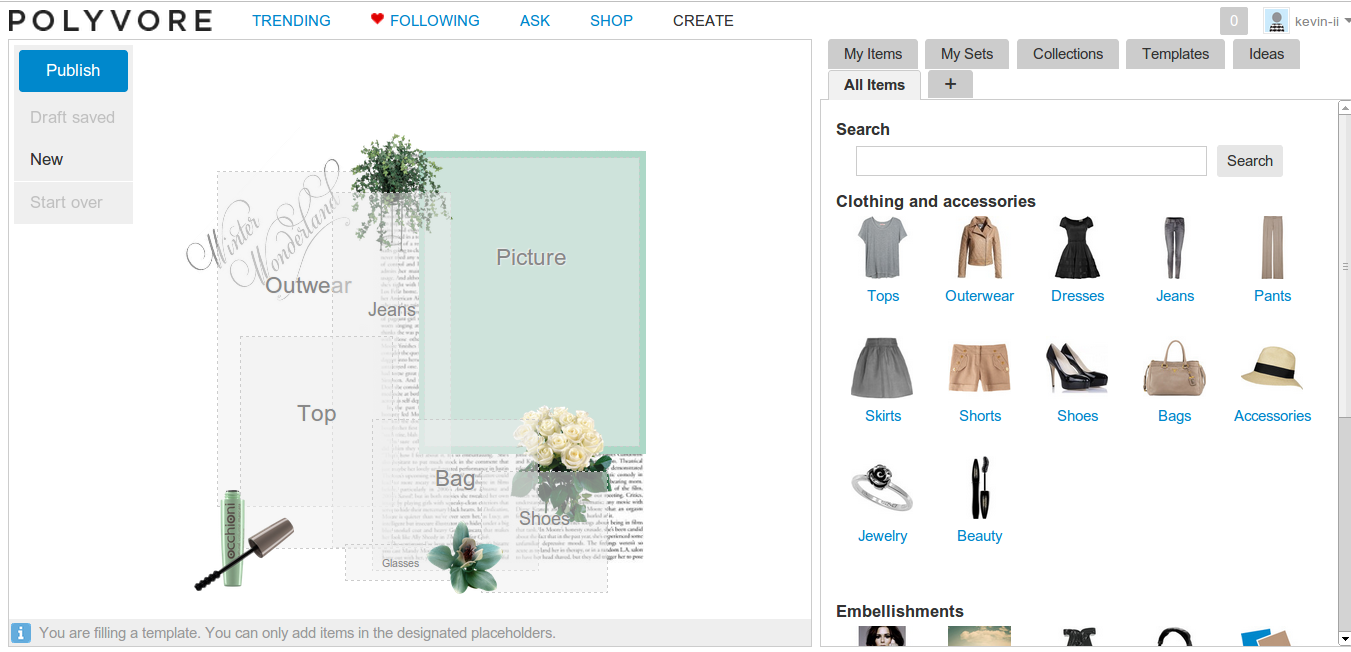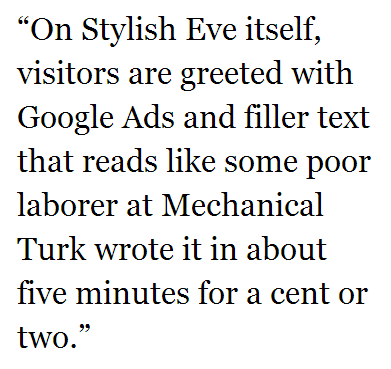Aly Monique spends her days studying nursing in Chicago, but at night she plays a stylist online. At the social-shopping site Polyvore, she creates fashionable ensembles with chic bags and cute designer dresses and sexy shoes. She has no training in the art of style, but the numbers prove her talent. Every time one of her sets gets posted to Facebook, tens of thousands of people like and share it. They gush with praise. They beg to know where they can buy every single item, right down to the accessories.
But Monique is completely clueless of her popularity.
Her images are being stolen by a Facebook page called Dresses and shared with its 2.9 million followers—without permission and without credit.
Every day, Facebook users talk about Dresses more than just about any other page on the social network. The “talking about this” statistic, which you can see at the top of every Facebook page, is perhaps the network’s most meaningful metric of success. It shows popularity, but also engagement. It’s about who shares you and who talks about you. Lady Gaga, with her 55 million subscribers, only manages to muster about 500,000 people talking about her at any given time. Dresses, by contrast, routinely pulls in a far more monstrous 2 million, and nearly every day, the page hits the top 30 most-talked-about pages, according to data provided by independent social analytics firm PageData.
The page’s success comes from stealing collages created by Monique, and others like her, and turning them into an endless stream of eye candy for style lovers. If you subscribe to Dresses, your Facebook page becomes a fashion catalog, barraged with cute pictures of ready-made outfits. It’s Facebook window shopping.
But it’s also spam. Each photograph serves as a vehicle to deliver links to either another Facebook page owned by the same group or, more commonly, to an external site called Stylish Eve—a self-proclaimed “online magazine” that consists of little more than boilerplate text, more stolen images, and huge Google ads.
It’s a content farm fertilized by Facebook.
***

Dresses is actually just the flagship page of a cleverly assembled spam empire, composed of at least 10 pages that boast a total readership of 5 million and subsist on a constant stream of mostly stolen images.
Stylish Eve and its accompanying network of social-spam pages are run by a team of Egyptians who have mastered the shallow psychology that drives Facebook’s human network. They’ve forged a simple formula for social domination that challenges Internet ethics at the same time as it challenges the very meaning of spam.
Stylish Eve subscribers want to be spammed. They love it.
Here’s how it works. Polyvore is a kind of a social online boutique. Users can mix and match outfits from a variety of other outlets—say LaRedoute and Republic—then save them as catchy collages on their user pages. If they want, they can make those ensembles public—a kind of Amazon Wishlist for the stylish crowd. When users click through to purchase from a store, Polyvore often makes money. It also draws a lot of revenue from native advertising on its home site.

An example of a Polyvore create page, where users can create their own ensembles from various designers.
What Polyvore users don’t know is that Mohamed El Saka, a 19-year-old from Egypt and self-described “stylist” and “advertiser,” is scouring Polyvore’s public accounts every day. When he sees a set he likes, he saves it and posts it to the Dresses Facebook page. Along with the stolen collages (or occasionally his own—both he and the main Stylish Eve account design their own sets), he’ll include a link to either Stylish Eve’s Facebook page or to the Stylish Eve site itself. He does not link or give credit to Polyvore or its users.
El Saka does this dozens of times a day. Most of his posts receive upwards of 10,000 likes and shares. Occasionally, he’ll toss in a link to a site that Facebook warns contains malware.
On Stylish Eve itself, visitors are greeted with Google ads and filler text that reads like some poor laborer at Mechanical Turk wrote it in about five minutes for a cent or two:
You love the style of women’s leather jackets and love being fashion forward, then choose blue leather jackets for women this season! By doing so, you’ll definitely achieve an attractive, unique, fashionable, and edgy look!
The text is followed by an avalanche of fashion photographs clearly nabbed from Polyvore or other online catalogs. Few posts link to online shops where users can actually buy the items shown in the photographs. In the comments section, Stylish Eve readers engage in a constant refrain: Where the hell can I actually purchase these items?
The network makes money with Google ads, which sit prominently at the top of each post and on the sidebar. It’s much more profitable to keep everyone’s eyes planted firmly on Stylish Eve itself, where all the Google ads reside, than to have them jump elsewhere.
It’s hard to imagine Stylish Eve succeeding on the merit of its content. But on Facebook, where success is measured in mindless likes and “talking about this” stats, Stylish Eve has figured out how to trick the system, much like how eHow and other content farms figured out how to fool Google’s search algorithm. Content farms work by publishing millions of low-quality fluff articles every month. Google’s search algorithm loves them. Readers hate them.

And much like those sites, which hurt Google by devaluing its core purpose of providing relevant search results, spam networks are ultimately corrupting Facebook. The social network’s entire business model is built on a promise to help users “connect and share with the people in your life.” There’s something undeniably robotic about Stylish Eve’s relentless image spam. It doesn’t foster connections; it turns Facebook into a pointless imageboard.
To get a sense for the simple smarts behind Stylish Eve’s success, just look at Polyvore’s own Facebook page. The site from which the Dresses page copies most of its content boasts a relatively measly 300,000 subscribers, with an even less impressive 8,000 “talking about this.”
Stylish Eve is better at advertising Polyvore than Polyvore itself.
The best way to see how the network works is to explore it yourself. Here are at least 10 of the pages Stylish Eve uses to spam content on Facebook.
- Dresses 2.9 million subscribers
- Home Decorating 1 million subscribers
- Stylish Eve Lovers 700,000 subscribers
- Heels 376,000 subscribers
- Makeup 89,000 subscribers
- Top Fashion 79,000 subscribers
- Chocolate 61,000 subscribers
- Outfits 54,000 subscribers
- I Love Dresses and Accessories 27,000 subscribers
- Fashionable 29,000 subscribers
***
To be fair, Stylish Eve isn’t the the only spammer at the top of the most-talked-about pages on Facebook. (You can find the full list here.) Nearly a million people are fans of the page “1-800-Choke-Dat-Hoe,” for instance, with about 1.5 million talking about it at any given time. It consists of images yanked straight from places like Reddit’s r/funny or FunnyJunk, along with a smattering of links to ChaCha, a site that essentially pays people to refer traffic to them.
And let’s not forget Ted’s Memes, a bizarre amalgam of bad adolescent humor, image macros from the 2012 Seth McFarlane comedy Ted, and links to the YouTube channel for a gaming clan called AcidX.
Admittedly, it almost seems unfair to label a Facebook page “spam.” Pages are supposed to be a platform for brands and public figures to reach out to fans, to “share their stories and connect with people,” as Facebook says. In that sense, they’re an advertising delivery system.
The company does consider certain types of behavior to be abuse, however. It defines page spam as anything that’s intended “to confuse, mislead, surprise, or defraud users.”
The key word there is “mislead.” Brands might use Facebook to promote themselves, but at least subscribers know what they’re getting. Sneaking affiliate links into a Facebook page is deceptive. So is populating your account with images you’ve stolen from other sites to spam links to an otherwise content-free blog. People who click on the “like” button for the Dresses Facebook page (or any of the nine others in the spam network) are doing so for the pretty pictures, not because they know or care about Stylish Eve.
At the very least, they want to know where they can buy the damn clothes they’re looking at.
***
On his own Facebook page, Mohammed El Saka claims to work for Google. He says he studied physical therapy at October 6 University and is the general manager for an English-language band called Never Down. He delights in the mini-celebrity his Facebook page has brought him. His own fan page boasts more than 80,000 subscribers, and he runs a constantly streaming question-and-answer session with fans at Ask.fm.
El Saka is effusive and cheery on Facebook. Hundreds of his fans message him every day. (“Your messages don’t make me angry,” he once wrote. “But in fact they make my day and they are my motivation :)”)

Like on Stylish Eve spam network sites, El Saka’s Facebook page is littered with people begging to know where they can actually buy the clothes he posts. “I don’t know anything about prices,” El Saka admitted in one post, “How to order or the designer .. i’m only stylist and advertiser.”
That’s an odd justification. Surely an “advertiser” would know where to purchase the clothing he advertised.
I wanted to learn more about how the figurehead page in the Stylish Eve spam empire worked. But El Saka is a tough man to reach, perhaps because he’s so busy answering those hundreds of daily fan messages.
After a couple of frustrating exchanges trying to set up an interview over GChat, I gave up. So on Thursday morning, I called the Alexandria, Egypt, number listed on the Stylish Eve GoDaddy registration page.
A man named Ahmed Helmy picked up the phone.
Helmy told me he was the founder and CEO of Stylish Eve—basically El Saka’s boss. He’s 25 and a graduate of the engineering department at Alexandria University. He launched Stylish Eve in 2009 to “publish my fashion ideas,” he said.
How did the site become so popular on Facebook? I asked. Helmy said that, shortly after launching, the Stylish Eve page got a lot of attention from other well-established pages with huge follower counts. That sounded fishy to me, since the Stylish Eve network works by spamming links to one another. Did he have any connection to the pages that helped Stylish Eve get its start? I asked. No, Helmy replied.
“Our data is extremely exclusive to us,” Helmy said. “We publish unique data on our page. So a lot pages extremely love our ideas and they wanted to share our ideas to other pages, so we got a lot of fans.”
A lot is an understatement. According to Helmy, they were drawing in 25,000 fans per day. Now his company, buoyed by the strength of its social presence, employs 20 people (all “girls” Helmy seemed keen to emphasize) as stylists.
But what about the content itself, I wanted to know: Are the images posted on your site and on Facebook your own? Why don’t you link to Polyvore?
Helmy replied: “Stylish Eve is about ideas. Inspiration ideas. All of the ideas are coming from our mind. They are not coming from other pages. But we pull some images from other sites. We created our reviews about Chanel and about Valentino shoes. So we use the Chanel images to review the shoes. But all of our content is exclusive to us.”
Of course, Helmy is glossing over the fact that the site’s so-called “reviews” almost never include the name of a single product. They may occasionally include the brand name, but they’re mostly just bland filler text. Nothing is being “reviewed.” Take this piece on Burberry’s winter line, for instance:
Stylish Eve shows you some outfits that include different Burberry pieces. Some might prefer to only wear a Burberry bag or boot, while other prefer to have that awesome shirt or the timeless scarf that keeps you warm while giving your outfit a standout even if it’s totally simple.
That’s it. There are no links. No names. No products mentioned or reviewed in any meaningful sense. It’s completely useless. (“Please post how one purchases these clothes,” one person begged in the comments.)
Since Stylish Eve writers are Egyptian, you could lay the blame on foreign language skills. But you don’t need need to speak English as a first language to include links or to explain why you think a product is good or bad.
When I asked Helmy why Stylish Eve doesn’t provide purchasing info, he forwarded me a post he’d just put up on the Stylish Eve Facebook, which addressed that very issue. According to Helmy, the items in their collections are simply too expensive.
“We tried multiple times to publish the purchasing details but all we got are bad comments about the price,” Helmy wrote. “You don’t know how much time is consumed to collect all of this information but after all of our efforts, we got bad feedback.”
While many items in the Stylish Eve collections (they run their own Polyvore account, too) are indeed pricey, many others are not. I don’t exactly buy a lot of women’s clothes, but even I know that a $30 dress is pretty cheap. And I can quite confidently declare that H&M is not anything close to a luxury brand.
Helmy’s note on Facebook, like a lot of what he told me, sounded like either a calculated excuse or a cynical misdirection.
***
When I told Monique her sets were getting huge responses on Facebook, she was shocked—and angry. Stylish Eve never reached out to her to ask if they could use those images. Her sets may not be original artwork, but they’re still something she spent a lot of time on.
“Polyvore is more than just for fun,” she wrote. “It’s something I’m taking seriously. I put a lot of time and work into my sets and the fact that someone could just take them and claim them as their own, without giving me my proper credit for it, is frustrating.”
She continued:
“I would like that page and every one of those pages shut down unless they plan on not only crediting me and others who are also on Polyvore, but also the designers that we use to make our fabulous sets.”
Monique is responding in perhaps the only sensible way. She’s created her own Facebook page.
She has 54 fans.
On Thursday, one of her sets was posted to the Dresses Facebook page. Nearly 10,000 people clicked “like.” That post promised more of the same if you clicked on an embedded link. It sent you to Stylish Eve.
Welcome to the content farm.
Illustration by Jason Reed

